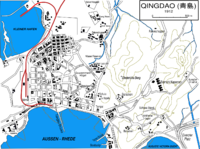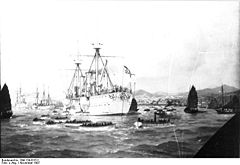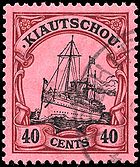
Jiaozhou Bay concession
Encyclopedia



The Kiautschou Bay concession was a German colonial
German colonial empire
The German colonial empire was an overseas domain formed in the late 19th century as part of the German Empire. Short-lived colonial efforts by individual German states had occurred in preceding centuries, but Imperial Germany's colonial efforts began in 1884...
concession
Concession (territory)
In international law, a concession is a territory within a country that is administered by an entity other than the state which holds sovereignty over it. This is usually a colonizing power, or at least mandated by one, as in the case of colonial chartered companies.Usually, it is conceded, that...
in Imperial China
Late Imperial China
Late Imperial China refers to the period between the end of Mongol rule in 1368 and the establishment of the Republic of China in 1912 and includes the Ming and Qing Dynasties...
which existed from 1898 to 1914. It had an area of 552 km², it was located around Jiaozhou Bay
Jiaozhou Bay
The Jiaozhou Bay is a sea gulf located in Qingdao Prefecture of Shandong Province. It was a German colonial concession from 1898 until 1914....
on the southern coast of the Shandong Peninsula, which lay in the imperial province of Shandong
Shandong
' is a Province located on the eastern coast of the People's Republic of China. Shandong has played a major role in Chinese history from the beginning of Chinese civilization along the lower reaches of the Yellow River and served as a pivotal cultural and religious site for Taoism, Chinese...
in northern China
China
Chinese civilization may refer to:* China for more general discussion of the country.* Chinese culture* Greater China, the transnational community of ethnic Chinese.* History of China* Sinosphere, the area historically affected by Chinese culture...
.
Jiaozhou was romanized as Kiaochow, Kiauchau or Kiao-Chau in English
English language
English is a West Germanic language that arose in the Anglo-Saxon kingdoms of England and spread into what was to become south-east Scotland under the influence of the Anglian medieval kingdom of Northumbria...
and Kiautschou or Kiaochau in German
German language
German is a West Germanic language, related to and classified alongside English and Dutch. With an estimated 90 – 98 million native speakers, German is one of the world's major languages and is the most widely-spoken first language in the European Union....
.
The administrative center was at Tsingtau (Chinese
Chinese language
The Chinese language is a language or language family consisting of varieties which are mutually intelligible to varying degrees. Originally the indigenous languages spoken by the Han Chinese in China, it forms one of the branches of Sino-Tibetan family of languages...
Qingdao).
Background of the expansion to China
Germany was a relative latecomer to the imperialistic scramble for colonies across the globe. But a German colony in China was envisioned as a two-fold enterprise: to support a naval presence, and that colonies (see German colonial empireGerman colonial empire
The German colonial empire was an overseas domain formed in the late 19th century as part of the German Empire. Short-lived colonial efforts by individual German states had occurred in preceding centuries, but Imperial Germany's colonial efforts began in 1884...
) were ideal to support the economy
Economic system
An economic system is the combination of the various agencies, entities that provide the economic structure that defines the social community. These agencies are joined by lines of trade and exchange along which goods, money etc. are continuously flowing. An example of such a system for a closed...
in the mother country. Densely populated China came into view as a potential market. Thinkers like Max Weber
Max Weber
Karl Emil Maximilian "Max" Weber was a German sociologist and political economist who profoundly influenced social theory, social research, and the discipline of sociology itself...
demanded an active colonial policy from the government. In particular the opening of China was made a high priority, because it was thought to be the most important non-European market in the world.
But a global policy (Weltpolitik
Weltpolitik
The "Weltpolitik" strategy was adopted by Germany in the late 19th century, replacing the earlier "Realpolitik" approach.The start of this policy was signaled in 1897 with then Foreign Minister Bernhard von Bülow stating that Germany now pursued such a policy...
) without global military influence appeared impracticable, so a navy was built. This fleet was supposed to give German interests emphasis during peace (gunboat diplomacy
Gunboat diplomacy
In international politics, gunboat diplomacy refers to the pursuit of foreign policy objectives with the aid of conspicuous displays of military power — implying or constituting a direct threat of warfare, should terms not be agreeable to the superior force....
) and to protect the German trade routes and disturb hostile ones during war (cruiser war
Cruiser
A cruiser is a type of warship. The term has been in use for several hundreds of years, and has had different meanings throughout this period...
concept). A network of global naval bases was a key requirement for this intention.
Nevertheless, the acquisition of a harbor in China was from the start subjected to the idea of a model colony: all installations, the administration, the surrounding infrastructure, the utilization was to show the Chinese, the German nation and other colonial powers an effective colonial policy.
German acquisition of the bay
In 1860, a Prussian expeditionaryEulenburg Expedition
The Eulenburg Expedition was a diplomatic mission conducted by Friedrich Albrecht zu Eulenburg on behalf of Prussia and the German Customs Union in 1859-62...
fleet arrived in Asia
Asia
Asia is the world's largest and most populous continent, located primarily in the eastern and northern hemispheres. It covers 8.7% of the Earth's total surface area and with approximately 3.879 billion people, it hosts 60% of the world's current human population...
and explored the region around Jiaozhou Bay. The following year the Prussian-Chinese Treaty of Peking was signed. After journeys to China between 1868 and 1871, the geographer Baron Ferdinand von Richthofen
Ferdinand von Richthofen
Ferdinand Freiherr von Richthofen was a German traveller, geographer, and scientist.-Biography:He was born in Carlsruhe, Prussian Silesia, and was educated in Breslau and Berlin. He traveled or studied in the Alps of Tyrol and the Carpathians in Transylvania...
recommended the Bay of Jiaozhou as a possible naval base. In 1896 Rear Admiral von Tirpitz
Alfred von Tirpitz
Alfred von Tirpitz was a German Admiral, Secretary of State of the German Imperial Naval Office, the powerful administrative branch of the German Imperial Navy from 1897 until 1916. Prussia never had a major navy, nor did the other German states before the German Empire was formed in 1871...
, at that time commander of the East Asian Cruiser Division
German East Asia Squadron
The German East Asia Squadron was a German Navy cruiser squadron which operated mainly in the Pacific Ocean between the 1870s and 1914...
, examined the area personally as well as three additional sites in China for the establishment of a naval base. Rear Admiral Otto von Diederichs
Otto von Diederichs
Ernst Otto von Diederichs was an Admiral of the German Imperial Navy, serving in the predecessor Prussian Navy and the Navy of the North German Confederation.-Education, war and peace:Diederichs entered the Prussian...
replaced Tirpitz in East Asia and focused on Jiaozhou Bay even though the Berlin admiralty had not formally decided on a base location.
On 1 November 1897, the Big Sword Society brutally murdered two German Roman Catholic priests of the Steyler Mission
Divine Word Missionaries
The Society of the Divine Word , popularly called the Divine Word Missionaries, and sometimes the Steyler Missionaries, is a missionary religious congregation in the Latin Church, one of the 23 sui iuris churches which make up the Catholic Church. As of 2006 it consisted of 6,102 members composed...
in Juye County
Juye County
Juye is a county in western Shandong province which is under the administration of Heze municipality. The county is 1,303 square km in area and has a population of approximately 910,000.-Qing & Republic:...
in southern Shandong
Shandong
' is a Province located on the eastern coast of the People's Republic of China. Shandong has played a major role in Chinese history from the beginning of Chinese civilization along the lower reaches of the Yellow River and served as a pivotal cultural and religious site for Taoism, Chinese...
. This event was known as the "Juye Incident
Juye Incident
The Juye Incident refers to the events of November 1, 1897, when a band of twenty to thirty armed men broke into a Catholic missionary compound in Juye County and killed Richard Henle and Francis Xavier Nies, two German missionaries of the Society of the Divine Word...
." Admiral von Diederichs, commander of the cruiser squadron, wired on 7 November 1897 to the admiralty: "May incidents be exploited in pursuit of further goals?" Upon receipt of the Diederichs cable, chancellor Chlodwig von Hohenlohe
Prince Chlodwig zu Hohenlohe-Schillingsfürst
Chlodwig Carl Viktor, Prince of Hohenlohe-Schillingsfürst, Prince of Ratibor and Corvey , usually referred to as the Prince of Hohenlohe, was a German statesman, who served as Chancellor of Germany and Prime Minister of Prussia from 1894 to 1900...
counseled caution, preferring a diplomatic resolution. However, Kaiser Wilhelm II intervened and the admiralty sent a message for Diederichs to "proceed immediately to Kiautschou with entire squadron ..." to which the admiral replied "will proceed ... with greatest energy."
Diederichs at that moment only had his division’s flagship SMS Kaiser
SMS Kaiser (1875)
SMS Kaiser was the lead ship of the s; was her sister ship. Named for the title "Kaiser" , held by the leader of the then newly created German Empire, the ship was laid down in the Samuda Brothers shipyard in London in 1871. The ship was launched in March 1874 and commissioned into the German...
and the light cruiser SMS Prinzess Wilhelm available at anchor at Shanghai, the corvette Arcona was laid up for repairs and the light cruiser Irene in a dockyard at Hong Kong for an engine refit. The shallow draft small cruiser Cormoran (independent of the cruiser division) was patrolling the Yangtze. Diederichs weighed anchor, ordered Prinzess Wilhelm to follow next day and Cormoran to catch up at sea. The three ships arrived off Tsingtao after dawn on 13 November 1897 but made no aggressive moves. With his staff and the three captains of his ships aboard, Diederichs landed with his admirals tender at Tsingtao’s long pier
Zhan Qiao
Zhan Qiao pier is at the southern shore of Qingdao off Zhongshan Road. This now 440 meter long strip stretches into the sea and was the first wharf at Qingdao. An octagonal pavilion called the Billowing Back and Forth Tower , loosely translated, stands at the end of the pier and was constructed...
to reconnoiter. He determined that his landing force would be vastly outnumbered by Chinese troops, but he had qualitative superiority.
At 0600, Sunday, 14 November 1897, Cormoran steamed into the inner harbor to provide inshore fire support, if necessary. Kaiser and Prinzess Wilhelm cleared boats to carry an amphibious force of 717 officers, petty officers and sailors armed with rifles. Diederichs on horseback and his column marched toward the Chinese main garrison and artillery battery, a special unit swiftly disabled the Chinese telegraph line and others occupied the outer forts and powder magazines. With speed and effectiveness, Diederichs’ actions had achieved their primary objective by 0815.
Signalmen restored the telegraph line and the first messages were received and deciphered. Diederichs was stunned to learn that his orders had been canceled and he was to suspend operations at Kiautschou pending negotiations with the Chinese government. If he had already occupied the village of Tsingtao, he was to consider his presence temporary. He responded, thinking the politicians in Berlin had lost their nerve to political or diplomatic complications: "Proclamation already published. ... Revocation not possible." After considerable time and uncertainty, the admiralty finally cabled congratulations and the proclamation to remain in effect; Wilhelm II promoted him to vice admiral.
Admiral von Diederichs consolidated his positions at Kiautschou Bay. The admiralty dispatched the protected cruiser
Protected cruiser
The protected cruiser is a type of naval cruiser of the late 19th century, so known because its armoured deck offered protection for vital machine spaces from shrapnel caused by exploding shells above...
SMS Kaiserin Augusta
SMS Kaiserin Augusta
SMS Kaiserin Augusta was a unique protected cruiser, built for the German Kaiserliche Marine in the early 1890s. She was laid down in 1890, launched in January 1892, and completed in November of that year. Owing to budgetary restrictions, Kaiserin Augusta was designed to fill both fleet scout and...
from the Mediterranean to Tsingtao to further strengthen the naval presence in East Asia. On 26 January 1898 the marines of III. Seebatallion
Seebatallione
The Seebatallione [sea battalions] were naval infantry troops or marines serving in the Prussian navy, the navy of the North German Confederation, the Imperial German Navy, the Wehrmacht, and briefly in the modern Federal German Navy, the Bundesmarine....
arrived on the liner Darmstadt. Kiautschou Bay was now secure.
Negotiations with the Chinese government began and on 6 March 1898 the German Empire retreated from outright cession of the area and accepted a leasehold of the bay for 99 years (as the British did in Hong Kong's New Territories). One month later the Reichstag ratified the treaty on 8 April 1898. Kiautschou Bay was officially placed under German protection by imperial decree on 27 April and Kapitän zur See [captain] Carl Rosendahl was appointed governor. These events ended Admiral von Diederichs' responsibility (but not his interest) in Kiautschou; he wrote that he had "fulfilled [his] purpose in the navy."
As a result of the German-Chinese lease contract the Chinese government gave up all its sovereign rights within the leased territory of approximately 83,000 inhabitants (to which the city of Jiaozhou did not belong), as well as in a 50 km wide security zone. The Gouvernement Kiautschou remained part of China under imperial reign, but for the duration of the lease was turned into a German Schutzgebiet [protectorate]. Moreover the treaty included rights for construction of railway lines and mining of local coal deposits. Many parts of Shandong outside of the German protectorate came under German influence. Although the lease contract set limits to the German expansion, it became starting point for the following cessions of Port Arthur
Lüshunkou
Lüshunkou is a district in the municipality of Dalian, Liaoning province, China. Also called Lüshun City or Lüshun Port, it was formerly known as both Port Arthur and Ryojun....
to Russia
Russia
Russia or , officially known as both Russia and the Russian Federation , is a country in northern Eurasia. It is a federal semi-presidential republic, comprising 83 federal subjects...
, of Weihaiwei to Great Britain
Great Britain
Great Britain or Britain is an island situated to the northwest of Continental Europe. It is the ninth largest island in the world, and the largest European island, as well as the largest of the British Isles...
and Kwang-Chou-Wan
Kwang-Chou-Wan
Kwang-Chou-Wan was a small enclave on the south coast of China ceded by Qing China to France as a leased territory, and ruled by France as an outlier of French Indo-China...
to France
France
The French Republic , The French Republic , The French Republic , (commonly known as France , is a unitary semi-presidential republic in Western Europe with several overseas territories and islands located on other continents and in the Indian, Pacific, and Atlantic oceans. Metropolitan France...
.
Organization and development of the protectorate

At the top of the colony stood the governor
Governor
A governor is a governing official, usually the executive of a non-sovereign level of government, ranking under the head of state...
(all five office holders were senior navy officers), who was directly subordinated to the secretary of state
Secretary of State
Secretary of State or State Secretary is a commonly used title for a senior or mid-level post in governments around the world. The role varies between countries, and in some cases there are multiple Secretaries of State in the Government....
of the RMA, Alfred von Tirpitz. The governor was head of the military and the civil administration within the colony. The former was run by the chief of staff and deputy governor, the latter by the Zivilkommissar [civil commissioner]. Further important functionaries of Kiautschou were the official for the construction of the harbor, and after 1900 the chief justice and the 'Commissioner for Chinese Affairs.' The Gouvernementsrat [government council of the protectorate] and after 1902 the 'Chinese Committee' acted as organs of advice for the governor. The departments of finance, construction, education and medical services were directly subordinated to the governor, because these were crucial with regard to the idea of a model colony.
.jpg)
With the expansion of economic activity and public works, German banks opened branch offices, the Deutsch-Asiatische Bank being the most prominent. The completion of the Shantung Railroad
Jiaoji railway
The Jiaozhou–Jinan Railway or Jiaoji Railway is railway in Shandong Province, China. The railway is 440.7km in length and connects Qingdao, on the Jiaozhou Bay, and Jinan, the provincial capital of Shandong...
in 1910 provided a connection to the Trans-Siberian Railway
Trans-Siberian Railway
The Trans-Siberian Railway is a network of railways connecting Moscow with the Russian Far East and the Sea of Japan. It is the longest railway in the world...
and thus allowed travel by train from Tsingtao to Berlin.
After the Chinese revolution of 1911 ran its course, many wealthy Chinese and politically connected ex-officials settled in the colony because of the safe and orderly environment it offered. Sun Yat-sen
Sun Yat-sen
Sun Yat-sen was a Chinese doctor, revolutionary and political leader. As the foremost pioneer of Nationalist China, Sun is frequently referred to as the "Father of the Nation" , a view agreed upon by both the People's Republic of China and the Republic of China...
visited the Tsingtao area and stated in 1912, “... I am impressed. The city is a true model for China’s future.”
Governors (all were naval officers with the rank of Kapitän zur See [captain]):
| Carl Rosendahl | 7 March 1898 – 19 February 1899 |
| Otto Jäschke | 19 February 1899 – 27 January 1901 (died in office) |
| Max Rollmann | 27 January 1901 – 8 June 1901 (acting) |
| Oskar von Truppel | 8 June 1901 – 19 August 1911 |
| Alfred Meyer-Waldeck | 19 August 1911 – 7 November 1914 |
Later history
On 23 August 1914 the Republic of ChinaRepublic of China
The Republic of China , commonly known as Taiwan , is a unitary sovereign state located in East Asia. Originally based in mainland China, the Republic of China currently governs the island of Taiwan , which forms over 99% of its current territory, as well as Penghu, Kinmen, Matsu and other minor...
canceled the German lease.
On 7 November 1914 the bay was occupied by Japan
Japan
Japan is an island nation in East Asia. Located in the Pacific Ocean, it lies to the east of the Sea of Japan, China, North Korea, South Korea and Russia, stretching from the Sea of Okhotsk in the north to the East China Sea and Taiwan in the south...
(see Siege of Tsingtao), which appointed two Military Governors: 7 November 1914 - 1919 Mitsuomi Kamio and 1919 - 10 December 1922 Mitsue Yuhi.
The occupied territory was returned to China on 10 December 1922. The Japanese again occupied the area from 1937 to 1945 during the Second Sino-Japanese War
Second Sino-Japanese War
The Second Sino-Japanese War was a military conflict fought primarily between the Republic of China and the Empire of Japan. From 1937 to 1941, China fought Japan with some economic help from Germany , the Soviet Union and the United States...
.
See also
- Sino-German relationsSino-German relationsSino-German relations were formally established in 1861, when Prussia and the Qing Empire concluded the first Sino-German treaty during the Eulenburg Expedition. Ten years later, the German empire was founded and the new state inherited the old Prussian treaty...
- Eulenburg ExpeditionEulenburg ExpeditionThe Eulenburg Expedition was a diplomatic mission conducted by Friedrich Albrecht zu Eulenburg on behalf of Prussia and the German Customs Union in 1859-62...
- Jiaozhou Governor's HallJiaozhou Governor's HallJiaozhou Governor's Hall is the former colonial government building during the German concession period at Qingdao, Shandong province of China...
, located in Qingdao. - Tsingtao beer, Germany's enduring legacy to Chinese brewing
External links
- German colonies (in German)
- WorldStatesmen

